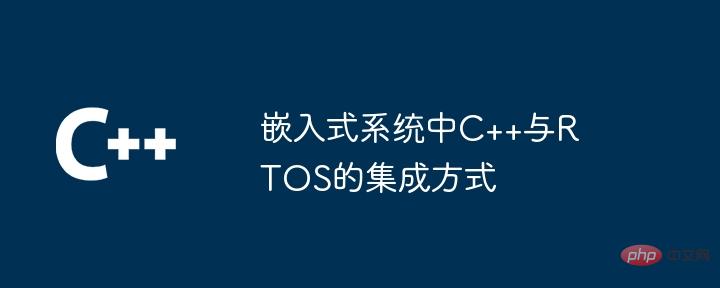
There are three methods for integrating C and RTOS in embedded systems: Interrupt-free method: C code is separated from RTOS scheduling and gives up real-time performance. Cooperative multitasking: C tasks interact with the RTOS, incurring context switching overhead. Preemptive multitasking: C tasks are scheduled by the RTOS, providing optimal real-time performance.

Integration of C and RTOS in embedded systems
Integration of C and real-time operating system (RTOS) in embedded systems For Improving performance and reliability is critical. This article introduces several methods of integrating C and RTOS and provides a practical case.
Method:
Practical case:
Consider an embedded system that needs to display a message on an LED while responding to a button press. The following example of writing C code using FreeRTOS and cooperative multitasking:
#include "FreeRTOS.h"
#include "task.h"
// 任务函数:显示消息
static void displayTask(void *pvParameters) {
while (true) {
// 显示消息
printf("Hello, world!\n");
// 等待下一次调用
vTaskSuspend(NULL);
}
}
// 任务函数:处理按钮按下
static void buttonTask(void *pvParameters) {
while (true) {
// 轮询按钮
if (isButtonDown()) {
// 通知显示任务显示消息
xTaskResumeFromISR(displayTask);
}
// 延时
vTaskDelay(100);
}
}
int main() {
// 创建显示任务
xTaskCreate(displayTask, "Display", 256, NULL, 1, NULL);
// 创建按钮任务
xTaskCreate(buttonTask, "Button", 128, NULL, 2, NULL);
// 启动任务调度器
vTaskStartScheduler();
return 0;
}Note:
The above is the detailed content of Integration method of C++ and RTOS in embedded systems. For more information, please follow other related articles on the PHP Chinese website!
 What are the differences between c++ and c language
What are the differences between c++ and c language
 Recommended learning order for c++ and python
Recommended learning order for c++ and python
 Cost-effectiveness analysis of learning python and c++
Cost-effectiveness analysis of learning python and c++
 Is c language the same as c++?
Is c language the same as c++?
 Which is better to learn first, c language or c++?
Which is better to learn first, c language or c++?
 The difference and connection between c language and c++
The difference and connection between c language and c++
 C++ software Chinese change tutorial
C++ software Chinese change tutorial
 Cost-effectiveness analysis of learning python, java and c++
Cost-effectiveness analysis of learning python, java and c++




